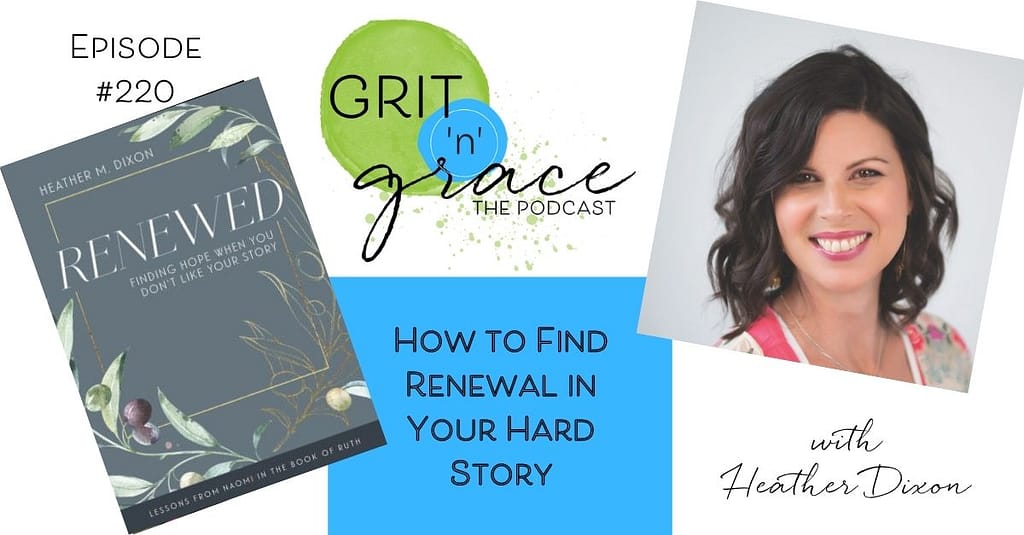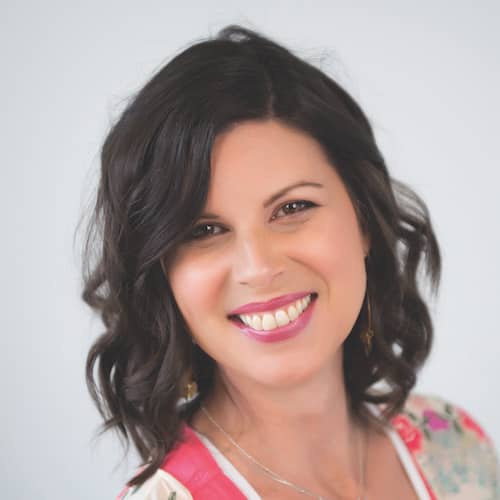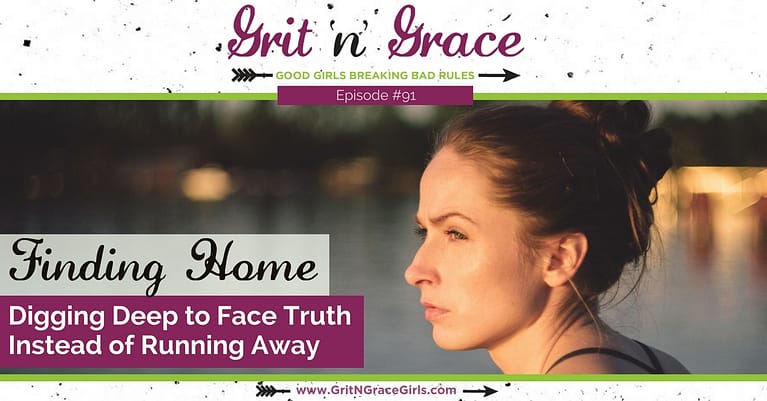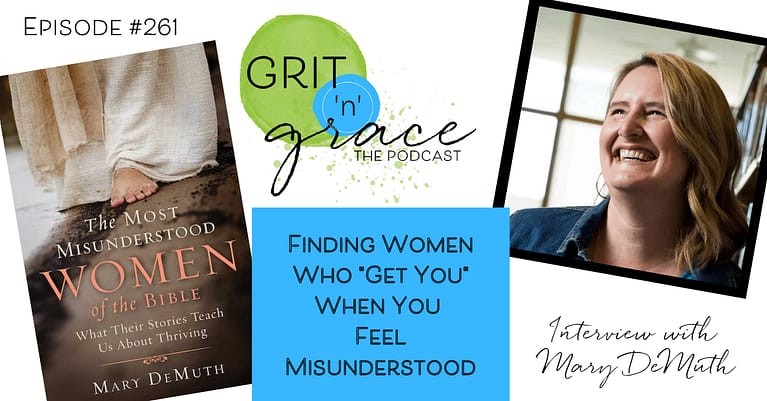What do you do when you’re drowning in the bitterness stoked by hard circumstances? Most of us don’t want to stay there but aren’t sure how to swim to higher ground. Heather Dixon, author of Renewed: Finding Hope When You Don’t Like Your Story, gives practical help from both her own difficult story and the biblical story of Naomi. Just when you’re about to give up and go under, there’s hope to hang on to!
(This page contains affiliate links. Your clicks and purchases help support Grit 'n' Grace at no extra charge to you.)
Recommended Resources
- Heather Dixon’s Bible study — Renewed: Finding Hope When You Don’t Like Your Story
- Heather Dixon’s website — https://therescuedletters.com/
Downloads
Your Turn
- When have you found yourself struggling with bitterness?
- How does the inclusion of Naomi’s story in the Bible help you to reframe your own wrestling?
- How did Heather’s admission about anxiety mixed with her strong faith change the way you see your own hard story?
Featured Author — Heather Dixon
Heather M. Dixon is an author, speaker, and Bible teacher who understands living with a story that is not easy.
Diagnosed with an incurable and terminal genetic disorder that she inherited from her mother, she is passionate about encouraging and equipping women to trust in God, face their greatest fears, and live with hope, especially amid difficult circumstances.
When she is not blogging at TheRescuedLetters.com or speaking at women’s conferences and events, Heather loves to make the most of everyday moments such as cooking for her husband and son, checking out way too many library books, or unashamedly indulging in her love for all things Disney.
Connect with Heather on her website, via Instagram, on Pinterest, and on Facebook!
Transcript — scroll to read here (or download above)
****
Grit ‘n’ Grace — The Podcast
Episode #200: How to Find Renewal in Your Hard Story
Note: This is an unedited, machine-generated transcript that is 70-80% accurate.
Amy Carroll 00:00
What do you do when you’re drowning in the bitterness stoked by hard circumstances? Sherry,
Cheri Gregory 00:05
I’m guessing I’m not supposed to admit that I had to the freezer to find my friends Ben and Jerry.
Amy Carroll 00:13
No, Sherry, you’re not supposed to admit that ice cream is not a spiritual discipline or although maybe it should be okay.
Cheri Gregory 00:21
Fine. What do you do when you’re drowning in the bitterness stowed by hard circumstances? Okay, so we don’t want to stay there. But exactly how do we swim to higher ground, especially when Amy won’t let us have ice cream?
Amy Carroll 00:35
(We are talking about a serious topic today, right?)
Cheri Gregory 00:41
We are … we are okay, getting down to business.
Amy Carroll 00:44
Today we’re talking to Heather Dixon author of renewed finding hope when you don’t like your story. She gives us practical help from both her own difficult story and the biblical story of Naomi. Just when you’re about to give up and go under, there’s hope to hang on to
Cheri Gregory 00:59
Well, this is Cheri Gregory.
Amy Carroll 01:02
And I’m Amy Carroll
Cheri Gregory 01:03
and you’re listening to grit and grace, the podcast that equips you to lose what you’re not love who you are, and live your one life.
Amy Carroll 01:11
Well. Today we’re talking with Heather Dixon, author of renewed finding hope when you don’t like your story. Heather Dixon is an author, speaker and Bible teacher who understands living with a story that’s not easy. diagnosed with an incurable and terminal genetic disorder that she inherited from her mother. She is passionate about encouraging and equipping women to trust God face their greatest fears and live with hope, especially amid difficult circumstances. When she’s not blogging at the rescue letters calm or speaking at women’s conferences and events. Heather loves to make the most of everyday moments such as cooking for her husband and son checking out way too many library books or unashamedly indulging her love for all things Disney,
Cheri Gregory 01:56
You know, Heather’s message is so incredibly timely. If I were to ask who doesn’t like your story right now, all of that a lot of us would be raising one or both hands. So true.
Amy Carroll 02:07
But so often we don’t know what to do about that story. So we swing to extremes, we hide it, dealing with all the fallout by ourselves, or we over share it. When we do that we can either wear people out with our own suffering or become hurt by unsafe people that we’ve shared with. What’s your natural response? Sherry?
Cheri Gregory 02:29
Oh, you mean, besides Ben and Jerry? I saw a Facebook post yesterday that asked the question, if you could choose, would you pause time or turn back time? And my answer was instantaneous. I would turn back time. I always want to redo I want to fix things. So I get the right outcome. How about you? What’s your go to response when you don’t like your story?
Amy Carroll 02:54
Well, I bet you and any listener who’s listened for very long can probably answer this for me, which is that, you know, I’ve been real open about my tendency to ghost and I do withdraw is my usual default response. I have this weird thing that I want to prove that I’m not high maintenance. And in the process of that I deprived myself as a comfort that comes from community.
Cheri Gregory 03:20
That’s a really good observation, Amy.
Amy Carroll 03:24
interesting observation, Amy. Wow. Read between the lines on that one friends, did you hear Cheri just say “Wow, you are really messed up!”
Cheri Gregory 03:39
Did you not say a word? Is my community not providing you with comfort?
Cheri Gregory 03:47
Okay, friends, if you’re struggling with a story that you don’t like, we get it. And so does today’s guest Heather Dixon. Here she is to help us leave behind all of our unhealthy responses, whether it’s fixing or ghosting, and pointing us in the one right direction to find hope.
Amy Carroll 04:06
Heather, we’re so happy you’re back with us today.
Heather Dixon 04:09
Thanks so much for having me gals. And so thrilled to see your faces where we’re recording and just thrilled to have everyone that’s listening here with us today. So thanks so much for having me on.
Amy Carroll 04:18
Well, we’re excited. But tell us how you came to write a book with such a daunting title renewed finding hope when you don’t like your story and tell us who you wrote it for. Okay, so
Heather Dixon 04:30
I write for two women. I write for the woman who was just a total Bible nerd. I think the Bible is a nerds paradise, and I am never at a loss for learning. And so I write for that woman I write for the woman who just wants to dig into God’s word and know more about his voice and his word. But I also write for the woman who doesn’t like her story. And I do that because I live with a story that I’m not really it’s not an easy one to carry, and so many of The women in my community are carrying similar hard stories, I’m not talking about a season of hardship, or you know, there’s a beginning and an end, they are walking through permanent life altering stories, whether it’s been the death of a loved one, or diagnosis and medical diagnosis like mine, which just changes your entire life, things that are just very, very difficult to carry. A lot of these women are in my community. And so I wrote this for them. And I think that at the heartbeat of what my ministry is, it is helping women find the courage to live by faith when they do not like their story. So that’s kind of why I wanted to write renewed is for them. And you know, I think that renewed is a it’s a Bible study about it’s on the book of Ruth. But it’s from Naomi’s perspective. Because I think that she is a woman like she is a little bit of a hot mess. I identify with her so much when I’m reading her, you know, her story through the book of Ruth. And so I wanted readers to have a safe place to kind of resonate with the things that she struggles with, because I struggle with that. And so, you know, I thought if I do and so many of the women in my community struggle with that as well. And maybe it might resonate with them, too. So that’s kind of why it’s how the roundabout way of how I wrote renewed finding hope when you don’t like your story.
Cheri Gregory 06:15
Well, some of our listeners today will remember an interview we had with you several years ago in which you did share a little bit of your story. So as you pointed out, renewed is a Bible study on Ruth and most studies focus on Ruth and Boaz, and you know, really go for the kind of the romance angle of it. But like you just said, renewed looks at Naomi’s story. So why do you think it’s such an important part of the book, and maybe you could just feel a little bit of your own backstory for our listeners who may not know you as well, in terms of sharing why Naomi resonates more with you?
Heather Dixon 06:52
Sure. I’ll start a little bit with my backstory, just to kind of you know, I remember that interview. And just a side note, so much of my ministry, I think was planted during my conversation with you gals during that interview, I think it was it was a turning point for my ministry. I remember that very clearly. But yeah, I’m a woman who doesn’t like her story. And I live with this and curable diagnosis. And there are a lot of milestones in my story that we could talk about that I don’t like we could talk about when my mom died when I was 11. And she was 37. We could talk about when my dad died when I was 3120 years later, both you know, sudden deaths, and then we could talk about my incurable diagnosis. I have a connective tissue disorder called vascular Ehlers danlos Syndrome. And it makes my blood vessels arteries and organs prone to spontaneous rupture so far, because of vascular eds. I’ve experienced a miscarriage preterm labor, a ruptured colon a partial kidney infarction, and you should tell your eight year old son that you have had a kidney infarction and there will be laughter for days. It’s just a word that sticks and it’s funny no matter how you say it, or tell it and and then I’ve had my carotid artery ruptured. And so I’ve had, you know, all these major medical events and which led my doctors to diagnose me with this genetic connective tissue disorder, which as it turns out, I inherited from my mom, and that is what took her life at the age of 37. And so the thing about my diagnosis is that there’s no cure for it, and there’s no treatment. So this is a part of my story that I just I don’t like because the life expectancy the average life expectancy of someone with my condition is 48. So there’s my story that I don’t like. And here’s why I resonate so much with Naomi and why think for her the book of Ruth is her story. I started teaching Bible study 20 years ago, and Ruth was one of the very first books I taught and I always taught it from Ruth perspective. And like you said, Ruth and Boaz are beautiful characters. We all love Ruth and Boaz. And yes, there is so much written about their presumed romance, whether that’s there or not, I don’t know. But you know, we love to kind of look at those characters. And they aren’t. They’re beautiful characters, but gals, they are stagnant. And so when you look at the book of Ruth, it’s Naomi that changes. She is the one that has this transformation from bitterness to renewed joy. And so I think, for me, I have always resonated so much with her side of the story, because she is the one where you see gospel transformation happening. And I think from a literal perspective, again, for those Bible nerds out there, Ruth is kind of a it’s a book of poetry. And there’s a lot of literary devices that happen in the book of Ruth that kind of give you a clue like this is about Naomi. Hey, this is about Naomi. This may be called Ruth, but this book is actually about Naomi. And so as you know, as a literary nerd, I really appreciate that side of it. And then lastly, it’s my personal belief that Naomi’s response to grief has often been judged a little bit too harshly. If you’re familiar with the book of Ruth, and you’re familiar with that story. When you hear the name Naomi, the word you’re going to resonate or think in your mind quickly is probably better, Naomi and better they kind of go ahead Hand in hand, what you don’t remember is that God didn’t judge her for her bitterness, she brought her through to the other side with renewed joy. And so I think I wanted my readers to get into the habit of offering grace to Naomi in, you know, the hopes that maybe if we offer grace to Naomi, we might be able to offer grace to ourselves, as we’re reading through that story. I don’t know, I resonate so much with Naomi and i think that you know, wanted to give my readers a safe place to explore feelings of grief and bitterness that are very real and honest and Okay, while at the same time, you know, looking to God and looking for his movement and looking for, you know, his details, as he’s bringing us through that same path from bitterness to renew joy. So I’m all about Naomi. I think it’s her story, and I’m so privileged to be able to teach it that way.
Amy Carroll 10:48
Well, Heather, it was such a surprise, at the end of the last time, we talked to find out that you live just miles from me, right? So I was just assuming he lived in another part of the country. And we were Skyping. And I’ve gotten the pleasure of watching your life on Facebook, like everybody gets to do, but then we’ve gotten to spend some time in person, and it’s just been a joy to get to know you and to watch her life a little bit. So tell our listeners a little bit about your life. How did your diagnosis change how you look at life? And what does living your one life? Well look like to you?
Heather Dixon 11:24
That’s a great question. And I’ll be honest with you, Amy, I think that the answer to that is always evolving. When we received our diagnosis, the first thing we looked at, we talked to our doctor about was okay, well, what do we take? What How do we change this? It was 2016. And, you know, we’re in an era of medical advancements and technology, let’s fix it. And you know, that’s when my doctor looked at me with very kind and compassionate eyes, I’ll never forget the look on his face. And he said, You know, there’s, there’s no cure treatment, your average life expectancy is 48. Here’s what I can offer you. And he said these words, prepare your bucket list and live your life well. And those words just stayed with me. And so it made me question, okay, what does that actually look like? What does living my life Well, looks like and, and so I think the first thing is, it’s the awareness when I wake up in the morning, that these 24 hours may be my last, and that seems kind of scary to deal with. But it’s actually you know, in a way that only God can transform, it’s a blessing, because there’s a sweetness to life, there’s a gratitude to the days that I have, and it makes me reprioritize and refocus my day. So in any given day, I look to honor God, love my family, I love my neighbors. Well, and I’m asking that question every single morning, you know, how do I accomplish these three things in this 24 hours, I’m not worried about the rest. So it gives me freedom to just live fully in this particular day, because I have such greater awareness that, you know, it might be my last year on the earth. And I think, you know, it changed my perspective on hardship. Anybody that walks through a particular you know, measure of suffering can quickly tell you what matters and what doesn’t. So, you know, having this diagnosis has been able to help me prioritize things that normally would have stressed me out, now, I’m not going to lie to you and tell you, I don’t deal with anxiety I do, you know, you don’t have this promise of major medical events without becoming best friends with anxiety. So she and I are very, very close. And it’s something I constantly struggle with. But you know, that perspective shift with hardship, I can easily say, you know, like, we have 99 problems, and this is not one of them. And I can easily kind of sort between, I’m gonna worry about this, and I’m not gonna worry about this. And so there’s a bit of freedom in that. And there’s a bit of freedom and knowing, you know, God’s gonna handle all of these things. And this is just not something that’s worthy of, you know, my mental space in my head. But I think I do I chase bucket list living and every single day now that may not look like you know, traveling across the world, it looks like making sustainable and lasting memories with the people that I love and the people that I serve. And that is, quite frankly, it’s a very sweet, sweet way to live. And that’s one of the blessings of having, you know, having a diagnosis like this, you’re just very grateful of every moment that you’re given. So those are some of the ways that you know, my diagnosis changed my life. But you know, ask me that question again and a year and I’ll give you a different answer. I love it.
Cheri Gregory 14:17
So back to Naomi for a little bit. You talked about her bitterness, I’d love for you to unpack what we can learn from Naomi’s bitterness about her situation. And maybe you could talk to us a bit about grieving the parts of stories that we don’t like versus giving into self pity.
Heather Dixon 14:34
Yeah, I think that one of the things that Naomi story reminds us the most is you have permission to grieve. And this is something that again, you know, when I mentioned I, you know, it’s my belief that Naomi has sometimes been judged a little too harshly. I think people skip over the fact that even her bitterness, she still says the Lord’s hand has gone out against me, she’s acknowledging God’s sovereignty, but she’s also giving herself space to grieve and to be honest with God about this is really awful. And I think that that’s something that our society skips over a lot, particularly in the Christian community, because we’re so quick to say, yes, this is awful, but God is good, close the book. And there’s no space to allow our heart and our mind and our emotions to really explore the idea that this is not okay. And this is not the way I want things to be. And I think we forget that even Jesus grieved, Jesus wept. You know, when his friend Lazarus was dead, and he came to heal him. He knew he was about to raise him up from death to life, but he still wept over last month because he grieves the brokenness in this world. And when we give ourselves permission to grieve, it’s a manifestation of our need for Jesus. It’s a manifestation and an acknowledgement that this broken world needs Jesus, it’s okay to say, God, I am so broken by this. And you know, the Lord promises he is close to the brokenhearted. He’s close to those who are crushed in our spirit and our hearts. He’s close to us, he understands. So we don’t have to be afraid of expressing, you know, our honest feelings to God, because he gets it. And I think the flip side to where that, you know, the line from where that goes from grief to self pity, honestly, is maybe different for every single person. But I think that what the book of Ruth reminds us is, even as we grieve, there are things we can do that will actively keep us pointing towards our hearts towards God. Now, I will tell you 100%, that when my father died, I skipped the rest. I grieved, I said, God, I hate you. I’m done. I left the church for four years, I walked away from it. And I very, very quickly to send it into a very dark season of self pity. It was one of the darkest seasons of my life, if not the darkest seasons of my life, even darker than the time after my diagnosis. Because I refuse to look and acknowledge the truth that God was working in my details behind the scenes, I refuse to acknowledge the truth that he was still working for my good, I believe the lies that this world tells us about hard stories that are difficult to carry. And I allowed my grief and bitterness to turn into self pity. Now, what the book of Ruth reminds us is God is working in our details. And we have the privilege of hindsight, you know, to see in Naomi’s story that, yes, she’s grieving. But then look, we move right into the second chapter of Ruth, and God is already working behind the details. And then you see, you know, Naomi accepting things that she can change, and she’s taking control over the things that she can actually do for herself while she’s waiting for God to move. So I think the transition line, or the barrier between grief and self pity, looks like acknowledging that God is moving and acknowledging that we are not helpless. And that we can take control of certain things and wait for God to move on the others. I wish I wish I had done that when my dad died. I wish someone had taught this study to me after my dad died. And I think it would have saved me years and years of self pity. But hopefully, you know, you know better you do better. And God was so gracious to me after that. So those are some of the ways that I think I try to differentiate between grief and just flat on self pity.
Cheri Gregory 18:13
That’s a really helpful distinction. Thanks, Heather.
Amy Carroll 18:15
It really is. And in in that story was woven in kind of how you viewed God during that time. So in the book you write God doesn’t call plays out of a playbook from clouds in the sky. He wants to walk with us along every step of our story holding our hand when we’re unsure of the plan. So help us a little bit, what are some of the things that we need to remember about God’s sovereignty when it comes to our story?
Heather Dixon 18:40
You know, me, I think that one of the biggest blessings or the deepest blessings that I’ve discovered walking with God through my heart story is that God is a relational God, he is not up in the sky calling playbooks out at us. He’s not holding the puppet strings and just making us dance at his will. He wants to walk every single step with us along the way and hold our hands through it. And we can trust him with that path because he is sovereign because he is in control because he is also compassionate, loving and merciful. I think another important thing to remember about his sovereignty is that, you know, he has a master plan, and we are a part of it. Our hard stories are a part of that master plan. He has a plan for us. He has a plan for his entire creation. And you know, we’re just divine. You know, we’re little puzzle pieces woven into this divine master plan that he is bringing the whole entire world and creation and our stories into something new to be renewed for His glory. And I think that every moment matters to him and knowing that he has a plan to renew every piece of our heart helps me trust Him and His sovereignty.
Cheri Gregory 19:52
So Heather, one of our listeners submitted some great questions for you, Amy, you go ahead and and go with the first one.
Amy Carroll 20:00
So the first part of our question is What if the story is the life of a carer? elderly parents, children with special needs, unresponsive spouse, etc? With no end in sight? So what if your What if your story has no resolution in sight? You know,
Heather Dixon 20:16
Amy, that that’s a really fantastic question. And my heart just goes out to anyone walking through that kind of a story where there is no end in sight. This is why we’re renewed, we’re not walking through seasons of hardship, we’re walking through permit stories of life altering change, you know, I think that what I would tell someone who is who is a caregiver, or a care of a special needs child, or an elderly parent is too baby steps, you know, to appreciate the baby steps appreciate the ordinary, appreciate the small wins, and every single day, I think that, you know, we can get really overwhelmed and we start looking at the distant future, you know, two years down the road, five years down the road, 10 years down the road. And the reality is, is that we may think we know how that’s gonna turn out. But we don’t God knows those pieces of our plan. He is the master planner, he is sovereign, he is in control. And so if I were that person, I would want someone to remind me Take small baby steps and every single day, you know, put on blinders to say, you know, I’m just going to live I’m just going to face these next 24 hours. One of our favorite memory verses with my family is don’t worry about tomorrow for tomorrow has enough trouble of its own. worry about if Sorry, I’m blanking because my son and I do this rap and we sing it in a rap because it helps him remember.
21:36
Hey, you could do the rap rap is welcome on Britton, Grace, Heather,
Cheri Gregory 21:39
just saying
21:41
it’s like, tomorrow will worry about its own self. Right? Well, I just that’s afford I remember him saying it tomorrow, we’ll worry about it.
Heather Dixon 21:56
But he, like he aced his memory verse test. So so But yeah, I mean, I think put those blinders on. And only look at what is happening today. Because we will just very quickly get overwhelmed if you know we are looking into the future. And for the caregiver also is a reminder that you are not there God you are not there, Jesus, and that God loves the person, you’re caring for so much more infinitely than you can ever even imagine. And I think for caregivers, the instinct, and the desire is to want to be everything at all times and you can’t, you are one person with human weaknesses. And I think you know, you have to release that person into God’s hands when you need rest, take it and know that God is going to take care of them also. And then the third thing I would say is employee village, hire, help ask for help ask for volunteer help. caregiving is hard work. But it’s also sacred work. You know, there’s so much this summer, I was really struck by you know, just love the person in front of you. Because that’s how Jesus did ministry. You know, right. I mean, there’s this woman and Luke seven, I think where, you know, she she’s grieving and he meets her and they come and they’re face to face, and she’s lost her only son. And we know anything about this woman except Jesus just goes immediately to her. He says, Don’t cry, you know, he loves her and he serves or he just loves the person right in front of them. The calling as a caregiver is a high one. And it’s a challenging one. But it is sacred work. Because I do believe that those who are called to serve the vulnerable and the weak in our society, society are ones that God will equip and sustain. Not the mightiest will equip all of us. But I do think there’s a special tenderness in him sustaining your energy ever those caregivers. So those are just a few of the things I would say about someone living with that kind of story.
Cheri Gregory 23:46
Thanks so much, Heather. So her second part of her question was how do I find rest from the chafing, which is bound to happen while living an uncomfortable story? And then I’m going to add from my own experience, how do you find rest from the regrets and recrimination? Like in some of these situations? There’s the If only I had known I would have or if only I had known I wouldn’t have?
Heather Dixon 24:09
Yeah, so one of the one of the things that I keep hearing a lot just in my own meditations and quiet time and just thinking through how God works in our life is progress over perfection. I’ve seen that quote, it’s not my quotes, not my phrase and can’t attribute it to the right person. But I keep thinking about how you know, we are constantly being worked on you know, we are we are always a work in progress. God is always working on our hearts. And, you know, I think that to get rid of the chafing of living with a hard story we have to remember two things. Number one, I think that those of us walking through hard stories, impossible situations, unchangeable situations are walking the Gospel story made manifest and what I mean by that is that i think that you know, we are we are presenting to the world. I am living With something that is impossible, I am living with something that can’t be changed by man. And what we tell the world when we choose to live and carry that hard story with grace is that God is good. And Jesus can cure all things, and Jesus can hold us together. And with Jesus, we can walk the story with compassion. I think that that is a tremendous story to be able to tell to the rest of humanity, that humanity needs, they need to see people walking through heart stories with Jesus. And I think that, you know, in terms of the past, and how to get rid of like passive doubts and things, you know, we are, we’re works in progress, and God is constantly evolving us, we’re not perfect, we’re never going to be perfect until he fully renews us, you know, and we’re new to the entire creation and all of humanity and he will But until then, you know, we’re just taking one step putting one foot in front of the other and trying to be better than the day before progress over perfection. And so I mean, obviously let go of the past you know, all God is making all things new. And if you’re in Christ, the you know, the old is gone, the newest come I mean, that is a truth we can cling to, I can’t tell you how many times I’ve wished I could just erase the mistakes in the sense that I made, you know, after my father died 100% wish I could, but I can’t. But what I did learn from those is that God will sustain me even through the hardest times anyway. And so now I know better I know to cling to him during these times. So cling to him, walk slowly, walk tenderly give yourself grace over these stories, in the same way that you’ll be prompted to give yourself grace over Dahomey, you know if we can give ourselves grace and these things, then, you know, maybe we’ll walk with a little bit more tenderness towards other people as well.
Amy Carroll 26:43
Beautiful that that answer is so full of grace and purpose. The last part of our question, this is this is read what she said to us. But she said, What do I say to people who tell me sometimes you have to spend time in God’s waiting room when you know it’s your life? And not a waiting room? Wow,
27:01
yeah.
Heather Dixon 27:03
I would probably personally, this, I would have to tamp down the Snark in my mind. And I would just smile very sweetly and say thank you so much for your kind words. And that you don’t here’s the thing, you don’t you know, you don’t owe other people an explanation for how you carry your story. You don’t owe other people an explanation for you know, how you are clinging to God. And you know, not everyone’s gonna understand that no one has walked in your shoes. There are so many times when I tried to explain my particular you know, the things that my particular condition and you know, what comes with that, and people don’t get it, and it’s okay, you know, who gets it, God gets it, he understands you, he understands the things that you’re carrying. And so, you know, if people are coming to you and telling you, well, you’re just you need to either repent, or you’re not spending enough time with God, right? Yes, don’t get me started, or you’re not spending enough time with God, or you need to just wait on God to move and when I tell them is, you know, same thing as before, you know what God has planted in me the Gospel story. And it’s a privilege to be able to share this with the world. And it may be I don’t say that to their face. I know that in my heart, I say, you know what I am carrying weakness. And you know, it is my thorn in my flash. But what it does is it makes me cling to Jesus that much tighter, and that is a blessing. And so, you know, I wink and smile and know that I understand the true gifts of walking with a story that we can’t change and there are gifts and blessings there. And not everybody else is gonna understand that. And that’s okay. But God does and he gets our true heart.
Amy Carroll 28:37
Well, thanks for giving us permission that we don’t have to embrace the cliche or even weep over the cliche, but we also don’t have to answer the cliche.
28:46
You know, anybody anything awesome.
Cheri Gregory 28:50
Okay, I’m not I’m not going to ask you to answer this question. I’m just going to say that you speak like a woman who’s been through these kind of crochets before and I suspect people have offered you supplements or suggested diets to you. There’s tried to give you specialists have told you that you have tried to tell you how to manage your disease. I’ve just seen it on your face. It’s oh my goodness,
Heather Dixon 29:11
I’m gonna answer this by telling you that I have a pre written thank you but no thank you response template that I just copy and paste. Thanks. But no thanks. If I had $1 for every time someone has tried to give me some sort of medical supplement, I would be rich woman. But that’s okay. their intentions are good, which is why my response is gracious, but then I delete it.
Cheri Gregory 29:33
You know what, I’m glad I mentioned it because I really I think that’s so valuable to know that you’re not making up a new response every single time you’ve got something pre planned, you execute the pre decision you execute it and you move on, because I would just execute the person let’s just be clear. Okay, we need to talk back about more about about Jesus again, obviously. So let’s go back to your Bible study. The fact that your your book is a Bible study tell us the format how each How long does each lesson take how many weeks and then what are are some other renewed resources available to go along with the study?
Heather Dixon 30:03
Sure. So the format is intentionally designed for women walking through busy seasons, I recognize that women who are caring hard stories very likely are also juggling a lot of responsibilities and time is usually an issue may be an issue for them. And so renewed is just four weeks long its roof, it’s there for chapters and routes you can read roof in a day. It’s so easy to get through. But we spend four weeks in the book of Ruth one chapter a week. And within each week, there are three what we call Bible study, teachers call homework assignments, or homework lessons. And there, it’s basically a workbook that just walks you through just some tangible and specific questions to help you walk through your own personal study of God’s Word and the book of Ruth. And then along with that, there’s, you know, a lot of Bible studies come with the book and then the separate leader guide the leader helps for renewed are actually in the participant workbook. So if you’re leading someone through renewed or leading a group through renew, you just need the participant workbook the leader helps are in the back. And then there are accompanying DVD teaching sessions, which are also about 20 to 25 minutes or less in length intentionally designed to give you time for group discussion, because I think that’s where the richness of diving into God’s word happens is when you start discussing it with other people. And then one additional resource that goes along with renewed is if you’re interested in leading a group, I have put together a leaders kit on my website. It’s the rescue letters.com backslash renewed and it’s got some scripture cards, a flyer, FAQ, just just some additional resources. If you’re leading a group to help you It’s free, you can just click the Download and then that’ll help you if you’re leading a group through through we need a little bit more so wonderful.
Amy Carroll 31:44
Well, so Heather, what closing words do you have for the woman who is desperate to find her while living a story she doesn’t like
Heather Dixon 31:53
Your story matters. Your story is not over. God is renewing your story even now, whether you can sense his presence or not. God is working in your details. God will transform your story to glorify Him and to bring you renewed joy. And his promise for renewal is ongoing and unending. So it’s not one and done. God’s promised for me what happens every single morning, just look at the sunrise in the morning when you wake up and watch the world change in front of you. It’s a tangible reminder of God’s promise for renewal and it exists for all of us, even you.
Cheri Gregory 32:29
“Your story matters. … Your story is not over. … And God is working in your details.
Amy Carroll 32:36
Well Cheri, you know how much I love Heather personally, and I’ve gotten to know her personally a little so hearing those words from her. He has a right to speak into this just brings me to instant tears the way that she lives them is beyond inspiring. It’s been amazingly instructive for my own personal life.
Cheri Gregory 32:56
Well friends Heather’s Bible study renewed finding hope when you don’t like your story is so so timely. If you’re in the midst of a story you don’t like gather some friends and dig into this study together
Amy Carroll 33:09
or if your circumstances are pretty good right now, why not pray about who in your life is struggling and how you could support them by going through this study right alongside them.
Cheri Gregory 33:19
Now I love the layout of this Bible study. It’s detailed enough to draw you in without being overwhelming. And it’s got lots of extra insights in the sidebars for those of us who are research nerds.
Amy Carroll 33:31
And I love the pacing and the timeframe three lessons a week for four weeks feels so doable, so you know it won’t get done unless you put it on your calendar. So look at your calendar today and set a time to do Heather’s study with some friends.
Cheri Gregory 33:45
Well friends, We sure hope you’ve enjoyed listening to Episode 220 of grit and grace the podcast as much as we’ve enjoyed making it for you.
Amy Carroll 33:53
And we want to say a big thank you to Heather Dixon, author of renewed finding hope when you don’t like your story and her publisher Abington press for making this episode possible. Check out our web page at grit and grace the podcast.com slash Episode 220 there you’ll find this week’s transcript a link to Heather Dixon’s book renewed finding hope when you don’t like your story and a link to Heather’s website.
Cheri Gregory 34:18
If you love grit and grace. The podcast one powerful way to share it is to write a review on iTunes. Here’s a couple that really encouraged us. This podcast is an absolute game changer. As a woman without strong female role models in my life. I’ve stumbled and fallen flat on my face 1000 times over and let me tell you, these women are so incredibly insightful, encouraging any I think she’s talking about us, they’re like, they helped lead you to the cross to love yourself like Jesus. And that’s just incredible. Thank y’all love it. I have the warm fuzzies and then I just had to read the next one because it just made me so happy. As a former Junior High teacher. This one says I am just amazed at how joyful this podcast makes me there is always a good message. I’m only 13 years old and even though I’m quite young, this podcast is still inspiring to listen to thank you, Sherry and
Amy Carroll 35:06
Amy. Love that mentoring the next generation. Hey, Sherry, didn’t we promise our listeners that if we read their review, and if they contacted them that we would send them a copy of exhale?
Cheri Gregory 35:20
Yes. So listeners, friends, if we read your review, and you hear us, just contact us to the website, and we will send you a free copy of our book, exhale.
Amy Carroll 35:31
Next week, we’ll be switching things up a bit as we talk with Sherry brand out of fashion. meatspace
Cheri Gregory 35:36
for today, grow your grit,
Amy Carroll 35:39
embrace God’s grace.
Cheri Gregory 35:41
And as God reveals the next step to live your one life. Well,
Amy Carroll 35:44
we’ll be cheering you on. So take it
You’ll never miss an episode when you sign up for weekly updates!










